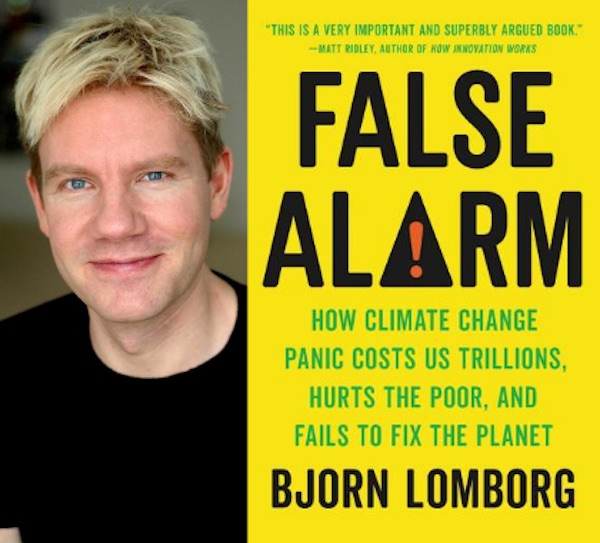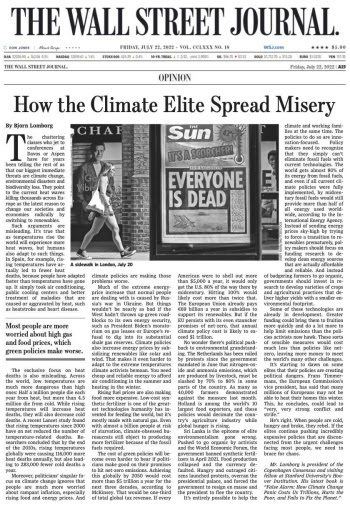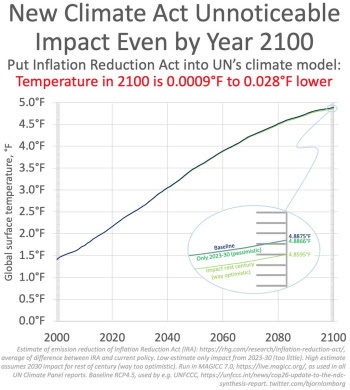Bjorn Lomborg
How the climate elite spread misery

Submitted by Bjorn Lomborg of the Copenhagen Consensus Center
 |
The chattering classes who jet to conferences at Davos or Aspen have for years been telling the rest of us that our biggest immediate threats are climate change, environmental disasters and biodiversity loss. Yet, their singular focus on climate change ignores that people are much more worried about rampant inflation, especially rising food and energy prices.

Unfortunately, climate policies are making those problems worse. Lomborg writes in The Wall Street Journal that when people are cold, hungry and broke, they rebel. If the elites continue pushing incredibly expensive policies that are disconnected from the urgent challenges facing most people, we need to brace for chaos.

He also discussed this topic in interviews with Paul Gigot on The Journal Editorial Report, with Laura Ingrahamand with Stuart Varney.
The rich are denying the poor the power to develop
Rich countries – despite their climate rhetoric – are heavily relying on coal, oil and gas to cope with the current energy crisis. Yet, the G7 recently decided to stop funding any fossil fuel projects in the developing world, immorally blocking the path for poorer countries to develop. This is clearly not what developing countries want, as their leaders and ordinary citizens have made very clear.

Cost-benefit analysis can help policymakers maximize social returns
The Copenhagen Consensus approach has successfully introduced a rational, data-driven input to national priority-setting in many countries, including Bangladesh, Haiti, India, Ghana and Malawi in recent years.
With the UN’s Sustainable Development Goals reaching their halfway mark by the end of this year, it is time to assess how much progress countries have made towards the goals, and what they should focus on over the following eight years to create the largest-possible benefits for their societies.

Lomborg argues in a full page article for the leading Honduran newspaper El Heraldo that data from economic science can help politicians and their officials pick more of the really effective programs and slightly fewer of the less so, to maximize social returns for every dollar spent.
US $369 billion climate bill has virtually no impact
President Biden enthusiastically describes his administration’s new Inflation Reduction Act as “the most significant legislation in history to tackle the climate crisis.” Curiously though, neither officials nor media praising the IRA are stating the actual climate impact of spending $369 billion on the bill’s climate provisions.

There’s a good reason for this: As Lomborg explains on social media and TV interviews, e.g. with Varney and Kudlow, the UN’s own climate model shows that the impact will be impossible to detect by mid-century and still unnoticeable even in the best case by the year 2100.

Lomborg’s findings were also highlighted in a Wall Street Journal editorial and by Fox News which reported that the White House and leading proponents of the bill “didn’t respond to inquiries” pointing out that the bill would slow down rising temperatures by merely 0.0009°F to 0.028°F in 2100.
Green energy needs to be affordable for everyone
The climate-policy approach of trying to push consumers and businesses away from fossil fuels with price spikes is causing substantial pain with little climate pay-off. In rich countries, this approach risks growing resentment and strife, as France saw with the “yellow vest” protest movement.

But for the poorest billions, rising energy prices are even more serious because they block the pathway out of poverty and make fertilizer unaffordable for farmers, imperiling food production. The well-off in rich countries might be able to withstand the pain of some climate policies, but emerging economies like India or low-income countries in Africa cannot afford to sacrifice poverty eradication and economic development to tackle climate change.
Read Bjorn Lomborg’s globally-syndicated column in publications such as New York Post and Press of Atlantic City (both USA), Financial Post (Canada), Neue Zürcher Zeitung (Switzerland), O Globo (Brazil), The Australian, Berlingske (Denmark), de Telegraaf (Netherlands), Tempi(Italy), Listy z naszego sadu (Poland), Addis Fortune(Ethiopia), Milenio (Mexico), El Periodico (Guatemala), La Prensa (Nicaragua), La Tercera (Chile), El Pais(Uruguay), La Prensa Grafica (El Salvador), El Universal(Venezuela), CRHoy (Costa Rica) and Listy z naszego sadu(Poland).

Lomborg also discussed the importance of affordable and reliable energy on Tucker Carlson Tonight.
‘False Alarm’ around the world
 Bjorn Lomborg’s bestselling book False Alarm* is now available in more than a dozen languages. Here is the Chinese edition, other translations include German, Czech, Spanish, Finnish, Norwegian and many more.
Bjorn Lomborg’s bestselling book False Alarm* is now available in more than a dozen languages. Here is the Chinese edition, other translations include German, Czech, Spanish, Finnish, Norwegian and many more.
The book remains an international success. The English original has been reprinted eight times in hardcover and six times in paperback, and several translations are also being reprinted now.
*As an Amazon Associate Copenhagen Consensus earns fromqualifying purchases.
Bjorn Lomborg
The Physics Behind The Spanish Blackout

From the Frontier Centre for Public Policy
Madrid knew solar and wind power were unreliable but pressed ahead anyway
When a grid failure plunged 55 million people in Spain and Portugal into darkness at the end of April, it should have been a wake-up call on green energy. Climate activists promised that solar and wind power were the future of cheap, dependable electricity. The massive half-day blackout shows otherwise. The nature of solar and wind generation makes grids that rely on them more prone to collapse—an issue that’s particularly expensive to ameliorate.
As I wrote in these pages in January, the data have long shown that environmentalists’ vision of cheap, reliable solar and wind energy was a mirage. The International Energy Agency’s latest cost data continue to underscore this: Consumers and businesses in countries with almost no solar and wind on average paid 11 U.S. cents for a kilowatt hour of electricity in 2023, but costs rise by more than 4 cents for every 10% increase in the portion of a nation’s power generation that’s covered by solar and wind. Green countries such as Germany pay 34 cents, more than 2.5 times the average U.S. rate and nearly four times China’s.
Prices are high in no small part because solar and wind require a duplicate backup energy system, often fossil-fuel driven, for when the sun doesn’t shine or the wind doesn’t blow. The Iberian blackout shows that the reliability issues and costs of solar and wind are worse than even this sort of data indicates.
Grids need to stay on a very stable frequency—generally 50 Hertz in Europe—or else you get blackouts. Fossil-fuel, hydro and nuclear generation all solve this problem naturally because they generate energy by powering massive spinning turbines. The inertia of these heavy rotating masses resists changes in speed and hence frequency, so that when sudden demand swings would otherwise drop or hike grid frequency, the turbines work as immense buffers. But wind and solar don’t power such heavy turbines to generate energy. It’s possible to make up for this with cutting-edge technology such as advanced inverters or synthetic inertia. But many solar and wind farms haven’t undergone these expensive upgrades. If a grid dominated by those two power sources gets off frequency, a blackout is more likely than in a system that relies on other energy sources.
Spain has been forcing its grid to rely more on unstable renewables. The country has pursued an aggressive green policy, including a commitment it adopted in 2021 to achieve “net zero” emissions by 2050. The share of solar and wind as a source of Spain’s electricity production went from less than 23% in 2015 to more than 43% last year. The government wants its total share of renewables to hit 81% in the next five years—even as it’s phasing out nuclear generation.
Just a week prior to the blackout, Spain bragged that for the first time, renewables delivered 100% of its electricity, though only for a period of minutes around 11:15 a.m. When it collapsed, the Iberian grid was powered by 74% renewable energy, with 55% coming from solar. It went down under the bright noon sun. When the Iberian grid frequency started faltering on April 28, the grid’s high proportion of solar and wind generation couldn’t stabilize it. This isn’t speculation; it’s physics. As the electricity supply across Spain collapsed, Portugal was pulled along, because the two countries are tightly interconnected through the Iberian electricity network.
Madrid had been warned. The parent company of Spain’s grid operator admitted in February: “The high penetration of renewable generation without the necessary technical capabilities in place to keep them operating properly in the event of a disturbance . . . can cause power generation outages, which could be severe.”
Yet the Spanish government is still in denial. Even while admitting that he didn’t know the April blackout’s cause, Prime Minister Pedro Sánchez insisted that there was “no empirical evidence” that renewables were to blame and that Spain is “not going to deviate a single millimeter” from its green energy ambitions.
Unless the country—and its neighbors—are comfortable with an increased risk of blackouts, this will require expensive upgrades. A new Reuters report written with an eye to the Iberian blackout finds that for Europe as a whole this would cost trillions of dollars in infrastructure updates. It’s possible that European politicians can talk voters into eating that cost. It’ll be impossible for India or nations in Africa to follow suit.
That may be unwelcome news to Mr. Sánchez, but even a prime minister can’t overcome physics. Spain’s commitment to solar and wind is forcing the country onto an unreliable, costly, more black-out-prone system. A common-sense approach would hold off on a sprint for carbon reductions and instead put money toward research into actually reliable, affordable green energy.
Unfortunately for Spain and those countries unlucky enough to be nearby, the Spanish energy system—as one Spanish politician put it—“is being managed with an enormous ideological bias.”
Bjorn Lomborg is president of the Copenhagen Consensus, a visiting fellow at Stanford University’s Hoover Institution and author of “Best Things First.”
Bjorn Lomborg
How Canada Can Respond to Climate Change Smartly

From the Fraser Institute
At a time when public finances are strained, and Canada and the world are facing many problems and threats, we need to consider policy choices carefully. On climate, we should spend smartly to solve it effectively, making sure there is enough money left over for all the other challenges.
A sensible response to climate change starts with telling it as it is. We are bombarded with doom-mongering that is too often just plain wrong. Climate change is a problem but it’s not the end of the world.
Yet the overheated rhetoric has convinced governments to spend taxpayer funds heavily on subsidizing current, inefficient solutions. In 2024, the world spent a record-setting CAD$3 trillion on the green energy transition. Taxpayers are directly and indirectly subsidizing millions of wind turbines and solar panels that do little for climate change but line the coffers of green energy companies.
We need to do better and invest more in the only realistic solution to climate change: low-carbon energy research and development. Studies indicate that every dollar invested in green R&D can prevent $11 in long-term climate damages, making it the most effective long-term global climate policy.
Throughout history, humanity has tackled major challenges not by imposing restrictions but by innovating and developing transformative technologies. We didn’t address 1950s air pollution in Los Angeles by banning cars but by creating the catalytic converter. We didn’t combat hunger by urging people to eat less, but through the 1960s Green Revolution that innovated high-yielding varieties to grow much more food.
In 1980, after the oil price shocks, the rich world spent more than 8 cents of every $100 of GDP on green R&D to find energy alternatives. As fossil fuels became cheap again, investment dropped. When climate concern grew, we forgot innovation and instead the focus shifted to subsidizing existing, ineffective solar and wind.
In 2015, governments promised to double green R&D spending by 2020, but did no such thing. By 2023, the rich world still wasn’t back to spending even 4 cents out of every $100 of GDP.
Globally, the rich world spends just CAD$35 billion on green R&D — one-hundredth of overall “green” spending. We should increase this four-fold to about $140 billion a year. Canada’s share would be less than $5 billion a year, less than a tenth of its 2024 CAD$50 billion energy transition spending.
This would allow us to accelerate green innovation and bring forward the day green becomes cheaper than fossil fuels. Breakthroughs are needed in many areas. Take nuclear power. Right now, it is way too expensive, largely because extensive regulations force the production of every new power plant into what essentially becomes a unique, eye-wateringly expensive, extravagant artwork.
The next generation of nuclear power would work on small, modular reactors that get type approval in the production stage and then get produced by the thousand at low cost. The merits of this approach are obvious: we don’t have a bureaucracy that, at a huge cost, certifies every consumer’s cellphone when it is bought. We don’t see every airport making ridiculously burdensome requirements for every newly built airplane. Instead, they both get type-approved and then mass-produced.
We should support the innovation of so-called fourth-generation nuclear power, because if Canadian innovation can make nuclear energy cheaper than fossil fuels, everyone in the world will be able to make the switch—not just rich, well-meaning Canadians, but China, India, and countries across Africa.
Of course, we don’t know if fourth-generation nuclear will work out. That is the nature of innovation. But with smarter spending on R&D, we can afford to focus on many potential technologies. We should consider investing in innovation to grow hydrogen production along with water purification, next-generation battery technology, growing algae on the ocean surface producing CO₂-free oil (a proposal from the decoder of the human genome, Craig Venter), CO₂ extraction, fusion, second-generation biofuels, and thousands of other potential areas.
We must stop believing that spending ever-more money subsidizing still-inefficient technology is going to be a major part of the climate solution. Telling voters across the world for many decades to be poorer, colder, less comfortable, with less meat, fewer cars and no plane travel will never work, and will certainly not be copied by China, India and Africa. What will work is innovating a future where green is cheaper.
Innovation needs to be the cornerstone of our climate policy. Secondly, we need to invest in adaptation. Adaptive infrastructure like green areas and water features help cool cities during heatwaves. Farmers already adapt their practices to suit changing climates. As temperatures rise, farmers plant earlier, with better-adapted varieties or change what they grow, allowing the world to be ever-better fed.
Adaptation has often been overlooked in climate change policy, or derided as a distraction from reducing emissions. The truth is it’s a crucial part of avoiding large parts of the climate problem.
Along with innovation and adaptation, the third climate policy is to drive human development. Lifting communities out of poverty and making them flourish is not just good in and of itself — it is also a defense against rising temperatures. Eliminating poverty reduces vulnerability to climate events like heat waves or hurricanes. Prosperous societies afford more healthcare, social protection, and investment in climate adaptation. Wealthy countries spend more on environmental preservation, reducing deforestation, and promoting conservation efforts.
Focusing funds on these three policy areas will mean Canada can help spark the breakthroughs that are needed to lower energy costs while reducing emissions and making future generations around the world more resilient to climate and all the other big challenges. The path to solving climate change lies in innovation, adaptation, and building prosperous economies.
-

 COVID-1912 hours ago
COVID-1912 hours agoOntario man launches new challenge against province’s latest attempt to ban free expression on roadside billboards
-

 Energy20 hours ago
Energy20 hours agoThis Canada Day, Celebrate Energy Renewal
-

 Business2 days ago
Business2 days agoWhile China Hacks Canada, B.C. Sends Them a Billion-Dollar Ship Building Contract
-

 Alberta1 day ago
Alberta1 day agoSo Alberta, what’s next?
-

 Alberta11 hours ago
Alberta11 hours agoAlberta Next Takes A Look At Alberta Provincial Police Force
-

 Bjorn Lomborg2 days ago
Bjorn Lomborg2 days agoThe Physics Behind The Spanish Blackout
-

 Alberta13 hours ago
Alberta13 hours agoCanadian Oil Sands Production Expected to Reach All-time Highs this Year Despite Lower Oil Prices
-

 Business15 hours ago
Business15 hours agoPotential For Abuse Embedded In Bill C-5





